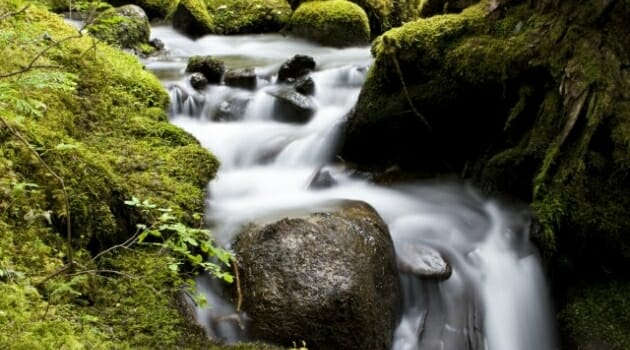Water quality in streams and lakes is vital for safe human recreational use by people, as well as for maintaining healthy ecosystems and wildlife. Healthy streams, rivers, lakes and wetlands support important local populations of aquatic life, such as fish, amphibians and invertebrates. They also provide:
- habitat,
- food sources, and;
- drinking water for other wildlife species such as bears, birds, beavers and more.
Learn about Whistler’s drinking water and wastewater.
Here are some examples of how we protect water quality in Whistler:
Inventory and monitoring
We conduct a range of water quality monitoring programs to help ensure the health of local waterways:
- Stream water quality monitoring: We have a comprehensive stream monitoring program which regularly examines the water quality in ecologically sensitive areas and near industrial sites. The goal of this program is to observe trends and, where needed, to take action to protect watersheds. Whistler’s stream water quality is typically very good.
- Lake water quality monitoring: In partnership with the BC Ministry of Environment, we implement an annual Lake monitoring program for major lakes to observe trends and take action where needed to protect human and wildlife health. Whistler’s lake water quality is typically very good.
- Beach water quality monitoring: Throughout the summer, municipal staff collect weekly samples from Lakeside, Wayside, Alpha Lake, Rainbow, and Lost Lake parks, which are analyzed for fecal coliform by a laboratory affiliated with Vancouver Coastal Health. If a swimming beach shows elevated concentrations of fecal coliform, the swimming area is typically closed until tests show acceptable results again. View the latest Beach Water Quality Results.
- Stormwater quality monitoring: We monitor flows from municipal biofiltration ponds to ensure regulations and guidelines for the protection of aquatic life and the goals of the Stormwater Management Plan are met. When needed, the municipality takes action to protect the health of Whistler’s waterways.

Working with partners
We maintain important working partnerships with multiple organizations to help protect the health of Whistler’s waterways:
- We participate with the British Columbia Lake Stewardship Society by promoting lake stewardship and monitoring water quality trends in the community’s lakes.
- We work with the BC Ministry of Environment collecting lake water quality data to help assess the health of Whistler’s and British Columbia’s ecosystems.
- We work with Vancouver Coastal Health to collect data and reduce health risks related to lake water quality for recreational swimmers.
- We collaborate with the Whistler Lakes Conservation Foundation.
- We collaborate with local tour operators to clean up Whistler’s lakes, to conduct public outreach, and to identify and resolve water quality issues.
Policy and planning
- Water quality protection is an integral part of Federal and Provincial regulations.
- The protection of Whistler’s water is integrated in the Official Community Plan.
- Whistler’s Environmental Protection Bylaw prohibits the discharge or leakage of polluting substances into streams or drainage works. It also prohibits the obstruction of flow to a stream or drainage works.
- We consider water quality impacts in the review of relevant development proposals, as well as in the development and operations of municipal stormwater systems.
How can you help?
Here are a few simple things you can to do help protect Whistler’s water and the health of Whistler’s watersheds:
- Don’t put anything except water down Whistler’s storm drains, as they all lead to fish-bearing habitat. Fix oil, brake fluid or antifreeze leaks right away and don’t wash your car with toxic substances on your driveway.
- Pick up after your outside pets. Like other contaminants, pet waste can get into streams and storm drains, spreading bacteria.
- Choose non-toxic household cleaners. The best way to reduce pollution to waterways is to use products that are not harmful to the environment.
- Volunteer. Help clean up Whistler’s beaches and lakes, or even measure lake turbidity and temperature of Whistler’s lakes. Contact stewardship@whistler.ca.
- Report water pollution or spills to stewardship@whistler.ca.